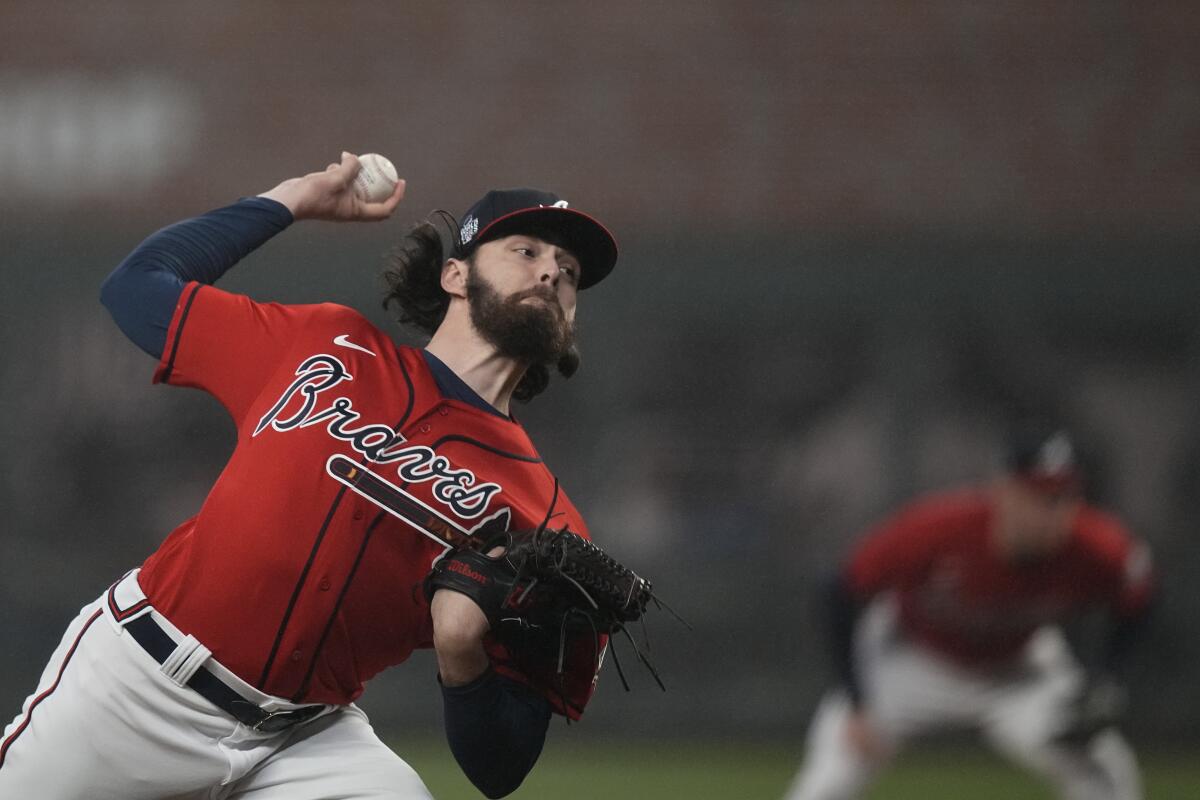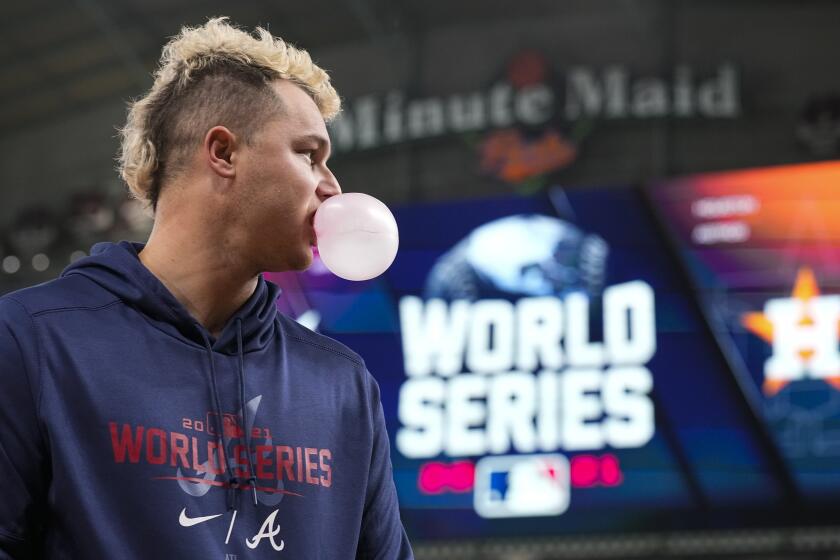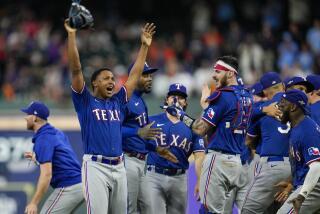Atlanta gambles on pitching strategy and beats Astros in Game 3 of World Series

- Share via
ATLANTA — Somewhere, Kevin Cash was probably kicking himself Friday night, thinking something along the lines of: That’s what was supposed to happen.
Game 3 of this year’s World Series, after all, looked an awful lot like Game 6 of last year’s edition.
The Atlanta Braves, like Cash’s Tampa Bay Rays team, were leading by one run. Similar to Rays ace Blake Snell the year before, Braves starter Ian Anderson had been stellar through the early innings, no-hitting the Houston Astros over the first five innings.
The Dodgers harnessed Joc Pederson’s October energy on the way to winning the World Series last year, and he’s doing the same for Atlanta vs. Houston.
And just like last year, the Braves made a high-stakes decision that was probably backed up by the numbers — even if it wasn’t best for the product of the game.
At the end of the fifth, and with the top of the Astros lineup due up for a third time in the sixth, manager Brian Snitker shook Anderson’s hand in the dugout and turned to his bullpen early, betting on an analytically modern approach that says a fresh bullpen arm is usually more effective than even the hottest starting pitcher.
Usually.
For Cash and the Rays, of course, the move backfired. Once Snell reluctantly left last October’s game, the Dodgers came to life, scoring three runs with Rays relievers on the mound to capture their first World Series in 32 years.

But, in a potentially pivotal swing game of this year’s series, the Braves’ gamble Friday paid off. They didn’t complete a combined no-hitter, but their bullpen paved the path to victory all the same, finishing off the Astros with four scoreless innings in an eventual 2-0 win.
The Braves lead the series two games to one, halfway to their first championship in 26 years.
As Snitker expected, Anderson initially lobbied to go back to the mound in the sixth, especially after he’d thrown only 76 pitches.
“He was like, ‘Are you sure?’” Snitker recalled postgame. “But I was like, ‘Ian, I’m going with my gut right here.’”
Snitker later expounded: “It could have backfired, I guess. But I thought at that point in time, in a game of this magnitude, he did his job. And we had a bullpen that all the guys we were gonna use had two days off.”
Just like last year, Snitker’s move sparked a wave of social media debate about what’s best for baseball:
A seemingly cutthroat, unsentimental style in which every last ounce of a roster is optimized with all the charm of an orange going through an industrial juicer? Or a more nostalgic version of the game where it’s up to fan-favorite starters to work deep, grind through fatigue and decide the result for better or worse?
The latter might be more emotionally compelling, more appealing to a broader audience of fans.
But the former has become increasingly viewed by teams as more effective.
Even an old-school presence like Snitker, a 66-year-old former minor-league coach who has spent his entire career in the Braves organization, looked at Friday’s game through that lens.

“The me of old probably, a couple years ago, would be like, ‘Why the hell am I doing this?’” Snitker said. “But he wasn’t gonna throw a no-hitter himself. It was gonna be a combined no-hitter if it did happen.”
A.J. Minter and Luke Jackson did keep the no-no alive through seven innings, the deepest a team had carried a no-hitter into a World Series game since 1967, before the Astros finally broke it up on Aledmys Díaz’s bloop shot against Tyler Matzek in the eighth.
But then Matzek responded, retiring the next three in a row to strand pinch-runner Jose Siri at third after he’d advanced on a stolen base and an error.
After Travis d’Arnaud doubled the Atlanta lead with a solo homer in the eighth, closer Will Smith slammed the door in the ninth, ensuring the Braves’ first World Series home game since 1999 ended in a shutout.
The decision to pull Anderson, however, reverberated the most afterward — within the context of Friday’s result, in comparison to last year’s Fall Classic, and in the larger existential conversation around the sport.
Snitker acknowledged that, when he’s standing at the top rail of the dugout, there’s no room in his head for historical significance or entertainment value.
“I need to win a baseball game,” he said.
Anderson didn’t publicly question the decision either.
“Obviously, you want the chance to compete, especially on the biggest stage like this,” he said, before later adding: “But I think, when you have a chance to get to those guys at the back end, you can’t hesitate.”
Matzek said the Braves bullpen didn’t even initially realize the Astros didn’t yet have a hit.
“Luke Jackson didn’t know, Minter didn’t know,” Matzek said, laughing. “After I got done with my inning, they said, ‘Did you know you gave up the first hit?’ Yeah, I did know. I paid attention.”
Then, like the rest of his teammates, Matzek supported the night’s defining decision as well.
“There’s a reason for it,” he said. “The guys, the front office, Snit, everybody’s gone over a few times what the game script is for us to win this thing. Obviously, the game script is right. We had a great, tough game, and we came out on top. I don’t second guess that at all.”
There were other factors that made the move easier to justify.
Anderson’s command had been spotty all night, an “effectively wild” approach, in Astros manager Dusty Baker’s words, that kept Houston’s hitters off-balance throughout the night, but also led to three walks and a hit-by-pitch, but also
During the regular season, Anderson’s statistics when facing a lineup for the third time, or when going past 75 pitches, were both noticeably worse than his averages too.
The back end of the Braves bullpen has also been dominant all postseason, having blown only one late-inning lead over their three playoff rounds.
It all added up to a decision that tested the existential nature of the game, that raised questions about which things the sport should value, but also propelled the Braves to a potential series-changing win, putting them in the driver’s seat going into Saturday’s Game 4.
Last year, Cash became a cautionary tale.
On Friday, Snitker was rewarded for a decision that even Anderson was willing to outwardly stand behind.
“[When] you’ve got guys like Matzek and Minter and Luke and Will at the back end coming in, you can’t blame him for going to those guys,” Anderson said. “Those guys, time in and time out, get it done, and they did it again tonight.”
More to Read
Go beyond the scoreboard
Get the latest on L.A.'s teams in the daily Sports Report newsletter.
You may occasionally receive promotional content from the Los Angeles Times.












